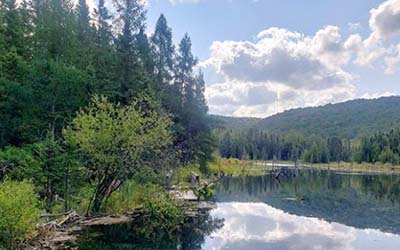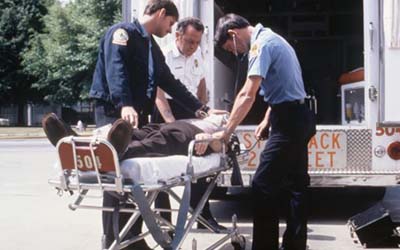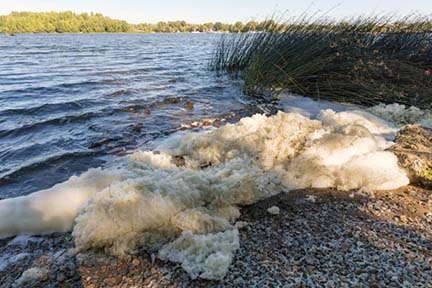| May 19, 2025
Contacts: Joe Nohner, 517-599-6825 or Chip Kosloski, 517-281-1705
Michigan fish and aquatic systems will benefit from over $1.1 million in grants
Funding will support projects in 13 Michigan counties
 Nine conservation projects on lakes and streams throughout the state will share more than $1.1 million, courtesy of Fisheries Habitat Grants from the Michigan Department of Natural Resources. The funds are matched by more than $250,000 in partner contributions, for a total conservation value of over $1.4 million. Nine conservation projects on lakes and streams throughout the state will share more than $1.1 million, courtesy of Fisheries Habitat Grants from the Michigan Department of Natural Resources. The funds are matched by more than $250,000 in partner contributions, for a total conservation value of over $1.4 million.
“We’re excited to support our partner organizations in projects to create healthier lakes and streams with healthier fish populations, better habitat and cleaner water,” said Randy Claramunt, chief of the DNR Fisheries Division. “Our natural resources make Michigan an outdoor recreation destination, and these projects will provide long-lasting benefits to protect and enhance this appeal.” |
The funded projects will rehabilitate and protect valuable fish habitats that provide the foundation for Michigan’s fisheries. Five of them are DNR Priority Habitat Conservation Projects — those proactively identified by the department as important to sustaining healthy habitats, fisheries and aquatic communities — and three are projects that directly benefit priorities of Michigan’s Wildlife Action Plan.
The Fisheries Habitat Grant program provides funding for a variety of activities including fish habitat conservation, dam removal and repair, resource assessment studies and access to recreation opportunities like fishing. Funding for the grant program comes from fishing license sales, state of Michigan general funds and a settlement with Consumers Energy. This funding is distributed through three grant areas: aquatic habitat conservation, dam management, and aquatic habitat and recreation in the Au Sable, Manistee and Muskegon river watersheds.
Up to $1.8 million typically is awarded each year through Fisheries Habitat Grants. However, the DNR is facing budget shortfalls caused by declines in revenue from fishing and hunting licenses that have resulted in cost-saving measures such as reductions in hiring, travel and other expenses. In order to balance its budget this year, the DNR Fisheries Division allocated approximately $600,000 of the aquatic habitat conservation funding for other eligible purposes and reduced grant funding by that amount. An additional $50,000 was used as matching funds to support a $5 million dam removal grant that the DNR received from the America the Beautiful Challenge.
The Fisheries Habitat Grant program also provides conditional commitments for funding in future years. These commitments enable partners to leverage future Fisheries Habitat Grant funds in applications for federal and other funding sources, making high-priority (and sometimes very expensive) projects possible. While no conditional commitments were made this year, the DNR did allocate $135,000 to the Conservation Resource Alliance, honoring a conditional commitment made to the organization to complete a Boyne Falls Dam removal options analysis (Charlevoix County) in its 2023 grant proposal.
Joe Nohner, a resource specialist with the DNR Fisheries Division, said the funded projects will protect and rehabilitate aquatic habitats across the state, while in many cases also improving public safety through the removal of dams.
“These projects are critical to strengthening and maintaining populations of fishes and other aquatic species,” Nohner said. “They will improve fish migration in over 92 miles of Michigan streams and boost public safety by working toward the removal of five dams and two culverts.”
Supporting work in 13 counties
This year’s funded projects (and counties where projects are located) include:
- Conservation Resource Alliance — Rapid River dam removal design and permitting phase project (Kalkaska County), $200,000.
- Upper Manistee Watershed Association — Improving fish habitat with additional wood from 2023 Michigan Trout Unlimited wood inventory (Crawford and Kalkaska counties), $40,500.
- Clinton River Watershed Council — Improving connectivity and aquatic organism passage in three Clinton River sub-watersheds (Macomb and Oakland counties), $48,900.
- Michigan State University — Macrophyte assessment in Northern Lake Michigan and Southern Lake Huron fisheries management units (Luce, Mackinac, Marquette and Ogemaw counties), $198,500.
- Conservation Resource Alliance — Restoring and reconnecting aquatic organism passage on Cedar Run and Victoria creeks (Leelanau County), $200,000.
- Kent County Drain Commissioner — Lower Tyler Creek meander restoration, $62,600.
- Huron Pines — Trout River Dam removal (Presque Isle County), $92,425.
- Muskegon River Watershed Assembly — Rowe Dam #1 removal on Penoyer Creek (Newaygo County), $310,000.
- Muskegon River Watershed Assembly — Hersey River Nartron Dam removal (Osceola County), $25,000.
Fisheries Habitat Grant funding is available annually to local, state, federal and tribal governments and nonprofit groups through an open, competitive process. The next request for proposals is expected to be announced in September.
Learn more about the Fisheries Habitat Grant program and other grant opportunities at Michigan.gov/DNRGrants.
Note to editors: An accompanying photo is available below for download. Caption/credit information follows.
- Rugg Pond Dam: Fisheries Habitat Grant funds would support removal design and permitting for Rugg Pond Dam, a high-hazard dam on the Rapid River that impedes Atlantic salmon and other fish species from accessing 21 miles of upstream habitat. Photo credit: Conservation Resource Alliance
|



 Nine conservation projects on lakes and streams throughout the state will share more than $1.1 million, courtesy of Fisheries Habitat Grants from the Michigan Department of Natural Resources. The funds are matched by more than $250,000 in partner contributions, for a total conservation value of over $1.4 million.
Nine conservation projects on lakes and streams throughout the state will share more than $1.1 million, courtesy of Fisheries Habitat Grants from the Michigan Department of Natural Resources. The funds are matched by more than $250,000 in partner contributions, for a total conservation value of over $1.4 million.






